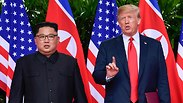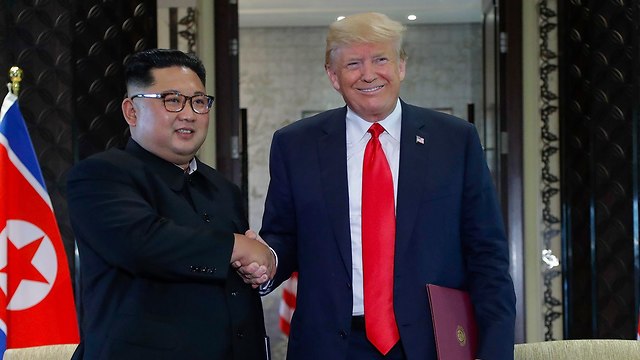
US President Donald Trump and North Korean leader Kim Jong-un
צילום: AP
How to measure success in Singapore?
Op-ed: Diplomacy should be based on facts, well-prepared, conducted seriously, and realistic about what it can achieve. In the end, the results are what matter. We will see if President Trump’s nuclear diplomacy can pass that test.
When US President Donald Trump and North Korean leader Kim Jong-un met in Singapore on Tuesday, the stakes could not be higher.


North Korea has an arsenal of nuclear weapons that would make the Iranian ayatollahs crazy with jealousy. North Korea has intercontinental ballistic missiles that can reach the United States. There is little doubt it can produce more of both.
After a year of insulting and threatening Kim on Twitter, President Trump decided abruptly to meet him without consulting his advisers. The summit was almost canceled at least once. But now it went forward.

Kim now is accepted as a leader of equal standing to the President of the United States, and so far, he has given up none of his nuclear capabilities (צילום: AP)
President Trump says he is confident that he will know very quickly if he can reach a deal with Kim. He has suggested that North Korea could receive significant economic benefits by reaching an agreement. He has even suggested that the United States could open an embassy in Pyongyang.
Kim has already scored an impressive achievement. His grandfather and father both sought meetings with US presidents and the legitimacy that comes with them, without success. Kim now is accepted as a leader of equal standing to the President of the United States, and so far, he has given up none of his nuclear capabilities.
But how should we measure success from Trump’s perspective? I would start with the President’s own standard. He called for complete, verifiable, irreversible denuclearization of the Korean Peninsula. That means North Korea relinquishing all of its nuclear weapons—it is believed to have dozens—and its ability to produce new ones—it is believed to have the capability to produce six each year. North Korea would also have to dismantle its intercontinental ballistic missiles, and shorter range missiles with the capability to carry a nuclear warhead. Inspectors would need to verify that North Korea had taken all those steps over an extended period of time.
Does all that seem possible in one meeting? With a North Korean leader who is even more unpredictable than Donald Trump? With a country that has many times in the past made promises to give up nuclear technology, and then violated them? With a leader who almost certainly sees nuclear weapons as the insurance policy that ensures the survival of his brutal regime?
I don’t believe that such results are possible from Tuesday’s summit. Success, if it comes, will be much more limited. It will involve the launching of a lengthy process in which diplomats and nuclear experts will negotiate over months and years. It might involve an early gesture by North Korea to dismantle part of its nuclear program, but it will require detailed follow-up by inspectors to know if the intentions are serious.

Trump may be so eager to declare a political victory, that he will ignore these details (צילום: רויטרס)
What worries me is that Trump may be so eager to declare a political victory, that he will ignore these details. He has already treated the deadly serious business of nuclear negotiations like a reality television program. He has shown no interest in mastering the history or complicated material of these negotiations, and declared that he did not need to prepare very much.
Trump’s disrespectful treatment of US allies, as was on display at the G-7, could be repeated in major splits with South Korea and Japan. He may unintentionally encourage China to ease sanctions on North Korea before it is warranted. He never mentions North Korea’s record of proliferation, including to Syria and Iran, or its terrible abuse of the human rights of its own citizens. He withdrew from a nuclear agreement with Iran that he said was not tough enough, but he shows signs of allowing North Korea to keep far more nuclear materials than Iran ever had.
If North Korea still has nuclear weapons and nuclear-capable missiles and the ability to produce them, there is no victory. There are only the first steps on a long journey that must be undertaken carefully.
I am in the camp that encourages diplomacy. So I hope for progress at this summit. But diplomacy should be based on facts, well-prepared, conducted seriously, and realistic about what it can achieve. In the end, the results are what matter. We will see if President Trump’s nuclear diplomacy can pass that test.
Daniel B. Shapiro is a visiting senior fellow at the Institute for National Security Studies (INSS) at Tel Aviv University. He served as US ambassador to Israel from 2011 to 2017.










